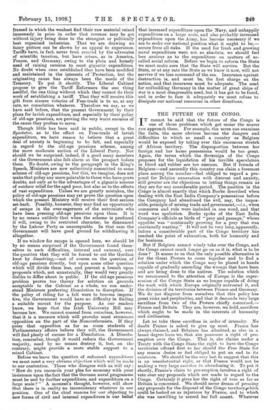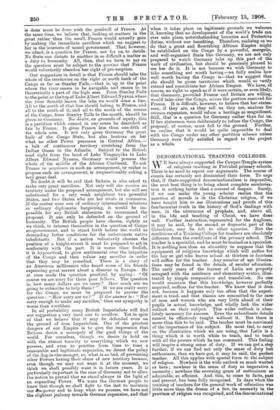THE FUTURE OF THE CONGO.
IT cannot be said that the future of the Congo is one of those problems which get easier the nearer you approach them. For example, the more one examines the facts, the more obvious become the dangers and difficulties to which so small a country as Belgium would be exposed by taking over this enormous stretch of African territory. The disproportion between her foreign and her home possessions would be too great. Again, the terms which the Sovereign of the Congo proposes for the liquidation of his terrible speculation in blood and rubber are too onerous. But if friends of Belgium—and assuredly this country can claim a foremost place among the number—feel obliged to regard a pro- posal for Belgian annexation with distrust and anxiety, still greater are the objections to letting things remain as they are for any considerable period. The position in the Congo is almost exactly that which Burke described when dealing with the East India Company's possessions before the Company had abandoned the evil, nay, the impos- sible, principle of mixing trade and government,—i.e., when commerce and rule were included in one word, and that word was spoliation. Burke spoke of the East India Company's officials as birds of "prey and passage," whose appetite was "continually growing for a prey that was continually wasting." It will not be very long, apparently, before a considerable part of the Congo territory has reached the point of exhaustion, both for humanity and for business.
But if Belgium cannot wisely take over the Congo, and the Congo cannot much longer go on as it is, what is to be done ? It seems to us that the only possible alternative is for the Great Powers to come together and to find a solution under which the Congo may be placed in hands capable of gradually amending the wrongs that have been and are being done to the natives. The solution which we recommend to the attention of Europe is the super- session of the Congo State as no longer capable of doing the work with which Europe originally entrusted it, and the division of its territories between France and Germany. We do not disguise from ourselves that this policy has great risks and perplexities, and that it demands very large sacrifices from two of the Powers chiefly concerned,— Prance and Britain. They are, however, we hold, sacrifices which ought to be made in the interests of humanity and civilisation.
Let us take these sacrifices in order of intensity. No doubt France is asked to give up most. France has always claimed, and Belgium has admitted, as also in a lesser degree have we, that she possesses a right of pre- emption over the Congo. That is, she claims under a Treaty with the Congo State the right to have the Congo territories offered first to her should the Free State for any reason desire or feel obliged to put an end to its existence. We should be the very last to suggest that this is an unsubstantial right, or that France would not be making a very large sacrifice in abandoning it. To put it shortly, France's claim to pre-emption involves a right of veto over any proposals which are made in regard to the Congo. Certainly it gives her the right of veto as far as Britain is concerned. We should never dream of pressing any proposals for the disposal of the Congo territoryehich could be looked on as injurious by France, and to which she was unwilling to -accord her full asseat. Whatever is done must be done with the goodwill of France. At the same time, we believe that, looking at matters in the great rather than the small, France would actually gain by making the immediate sacrifices which we suggest to her in the interests of sound government. That, however, we admit, is a question for France, not for us, to decide. No State can dictate to another in so difficult a matter as a duty to humanity. All, then, that we have to say on the question must be subject to the proviso that France would voluntarily abandon her right of pre-emption.
Our suggestion in detail is that France should take the whole of the territories on the right or north bank of the Congo as far as Stanley Falls,—that is, up to the point where the river ceases to be navigable and ceases to be theoretically a part of the high seas. From Stanley Falls to the point at the top of Lake Albert Edward Nyanza where the river Semliki leaves the lake we would draw a line. All to the north of that line should belong to France, and all to the south of it, and all to the south of the course of the Congo, from Stanley Falls to the mouth, should be given to Germany. No doubt, on grounds of equity, this is a partition which cannot in any sense be described as fair to France. It gives France less than one-fifth of the whole area. It not only gives Germany the great bulk of the Congo State, but also bestows on her what no other Power possesses in Central Africa,— a belt of continuous territory stretching from the Indian Ocean to the Atlantic. Subject to the British road right from the head of Lake Tanganyika to Lake Albert Edward Nyanza, Germany would possess the whole of the middle of the African Continent. To ask France to acquiesce in such an arrangement, or rather to propose such an arrangement, is unquestionably asking a very great deal. No doubt it will be said that Britain is also asked to make very great sacrifices. Not only will she receive no territory under the proposed arrangement, but she will see substituted for a very weak neighbour two powerful States, and two States who are her rivals in commerce. If the matter were one of ordinary international relations or ordinary diplomatic bargaining, it would be im- possible for any British statesman to recommend the proposal. It can only be defended on the ground of humanity. The British people have chosen, rightly as we think, to interest themselves in the question of Congo misgovernment, and to stand forth before the world as demandinc, better conditions for the unfortunate native inhabitants. But if a nation voluntarily chooses the position of a knight-errant it must be prepared to act in conformity with the part. It is worse than foolish, it is hypocritical, to grow sentimental over the iniquities of the Congo and then refuse any sacrifice in order that they may be remedied. There is a story of an American millionaire who heard some of his friends expressing great sorrow about a disaster in Europe. He at once made the question practical by saying : "Of course we are sorry for these poor fellows. The question is, how many dollars are we sorry ? How much are we going to subscribe to help them ? " If we are really sorry for the Congo, we must be prepared to answer the question : "How sorry are we ? ' If the answer is : "Not sorry enough to make any sacrifice," then our sympathy is worse than worthless.
In all probability many British Imperialists will find our suggestion a very hard one to swallow. Yet in spite of that we believe that it may be defended even on the ground of true Imperialism. One of the greatest dangers of our Empire is to give the impression that Britons desire a monopoly of the good things of the world. For ourselves, though we desire to hold on with the utmost tenacity to everything which we now possess, and even to practise from time to time a reasonable and legitimate expansion, we detest the policy of the dog-in-the-manger, or, what is as bad, of preventing other Powers having their share of new territory because, even though we may not want it at the moment, we think we shall possibly want it in future years. It is particularly important in the case of Germany not to allow the notion to prevail that we stand always in the light of an expanding Power. We want the German people to know that though we shall fight to the last to maintain our ika-power and to keep what we possess, we have not the slightest jealousy towards German expansion, and that when it takes place on legitimate grounds we welcome it, knowing that no development of the world's trade can ever take place, notwithstanding bounties and Protective duties, without our benefiting. Therefore, realising as we do that a great and flourishing African Empire might be established on the Congo by a powerful, energetic, and well-organised State like Germany, we are not only prepared to watch Germany take up this part of the work of civilisation, but should be genuinely pleased to see her do it. It is not because we wish Germany to take something not worth having—we fully realise how well worth having the Congo is—that we suggest that she should be given territories which would so vastly extend and consolidate her African Empire. We have, of course, no right to speak as if it were certain, or even likely, that Germany, provided France and. Britain are willing, would take over the Congo, minus the portion reserved for France. It is difficult, however, to believe that her states- men, if they are, as they tell us they are, anxious for oversea expansion, would refuse a heritage so magnificent. Still, that is a question for Germany rather than for us. If her statesmen were deliberately to refuse the Congo, the proposal, of course, must fall to the ground. Further, we realise that it would be quite impossible to deal with the Congo under any other partition scheme unless Germany were fully satisfied in regard to the project as a whole.





































 Previous page
Previous page